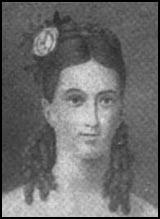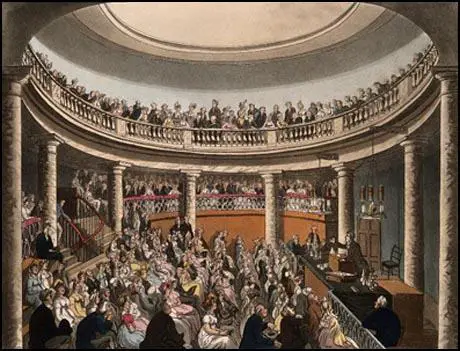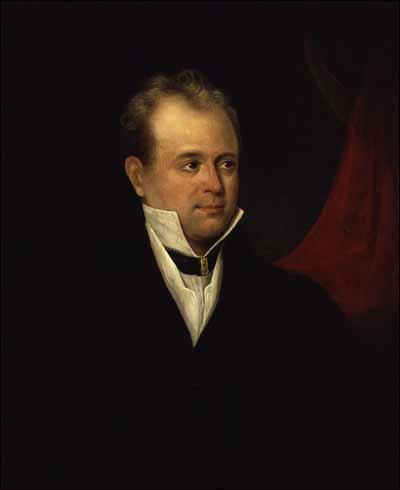Elizabeth Sharples

Elizabeth Sharples was one of six children born to Ann and Richard Sharples, a manufacturer, in Bolton in 1803. The children received a good education, and Eliza attended boarding-school until she was about twenty. Sharples held conservative views until she began reading The Republican in 1830. She wrote to its editor, Richard Carlile, and after "a rapid exchange of correspondence in which admiration turned to ardent love, she determined to share his work". (1)
Even before he had met Sharples in person, Carlile anticipated that she would become "my daughter, my sister, my friend, my companion, my wife, my sweetheart, my everything". (2)
Richard Carlile published an article in his new newspaper, The Prompter, in support of agricultural labourers campaigning against wage cuts. Carlile's advice to the labourers was "to go on as you have done". (3) This was interpreted by the authorities as a seditious call to arms. Carlile was arrested and charged with seditious libel and appeared at the Old Bailey in January 1831. Carlile argued that "neither in deed, nor in word, nor in idea, did I ever encourage acts of arson or machine breaking". (4)
The court was not convinced by his arguments and Carlile was found guilty of seditious libel and received a sentence of two years' imprisonment and a large fine which he refused to pay, thereby extending the sentence by a further six months. While in prison he continued to write articles for radical newspapers and pamphlets such as New View of Insanity (1831). (5)
Blackfriars Rotunda
In January 1832 Elizabeth Sharples moved to London and visited Carlile in prison. Carlile had always campaigned for women's rights and he invited her to speak at his Blackfriars Rotunda. Several times a week speakers delivered "attacks on the superstitions of Christianity, which Carlile had now identified as the single most obdurate opposition to reform and liberation". The Rotunda became an important centre for working-class dissent and political reform. Speakers included William Cobbett, Henry 'Orator' Hunt, Robert Owen, Daniel O'Connell, Robert Taylor and John Gale Jones. It is reported that at one meeting calling for parliamentary reform, drew a crowd of over 2,000 people. (6)

Billed as "the first Englishwoman to speak publicly on matters of politics and religion" she gave her first talk on 29th January 1832. (7) The Times reported that she was "pretty, with a good figure and genteel manners" and dressed very well. (8) Sharples pointed out in her speech: "I will set before my sex the example of asserting an equality for them with their present lords and masters, and strive to teach all, yes, all, that the undue submission, which constitutes slavery, is honourable to none; while the mutual submission, which leads to mutual good, is to all alike dignified and honourable." (9) "Cast in the role of the Egyptian goddess Isis, she stood on the stage of the theatre, the floor strewn with whitethorn and laurel, and delivered lectures on mystical religion and women's rights." (10)
Elizabeth Sharples and Isis
Elizabeth Sharples was appointed as editor of a new radical weekly publication, Isis. She gave two lectures every Sunday (at sixpence for the pit and boxes, one shilling for the gallery), on Monday evenings (for half-price). She also gave a free lecture on Friday evenings to accommodate those unable to afford the entry charges. (11)
Not everybody enjoyed her speeches. One man wrote to a national newspaper attacking the idea of a woman speaking in public: "Elizabeth Sharples is a female who exhibits herself in so unfeminine a manner... So utterly illiterate is the poor creature, that she cannot yet read what is set down for her with any degree of intelligibility... with her ignorance and unconquerable brogue... her lecturing is almost as ludicrous as it is painful to witness." (12)
Richard Carlile supported Sharples in her campaign for women's rights: "I do not like the doctrine of women keeping at home, and minding the house and the family. It is as much the proper business of the man as the woman; and the woman, who is so confined, is not the proper companion of the public useful man." (13) Edward Royle adds that "this just about sums up the position of women in the radical movement". Even if a woman was emancipated she was expected to be the "proper companion of the public useful man". (14)
Elizabeth Sharples argued in her newspaper articles that Christianity was the chief barrier to the dissemination of knowledge; by denying the people education, priests were denying man's liberty. She suggested that passive and non-resistance was seen as the "doctrine of priesthood". (15)
Sharples was Carlile's greatest supporter while he was in prison. She used the Rotunda platform" to castigate the priesthood, expose religious superstition and denigrate established authority". She promised "sweet revenge" on those responsible for the "incarceration of Carlile". She visited him in prison and began a sexual relationship. (16)
Moral Marriage
In 1832 Jane Carlile moved out of the family home and started a bookshop of her own. In April 1833 Elizabeth Sharples gave birth to a son, Richard Sharples. Carlile realized that he would have to acknowledge their relationship, and thereupon declared that he and Eliza were joined in a "moral marriage". (17)
Elizabeth Sharples had the task of running the Blackfriars Rotunda while Carlile was in prison. In February 1832, she reported that £1,000 was needed to keep the venture open, to cover rent, taxes, lights and repairs. At the same time there had been a reduction in audiences. She admitted that she had lost the support of the radical community: "I believe I stand alone in the country, as a modern Eve, daring to pluck the fruit of the tree, and to give it to timid, sheepish man. I have received kindnesses and encouragements from a few ladies since my appearance in the metropolis, but how few." (18)

In August 1833, Richard Carlile was released from prison.The couple lived on the corner of Bouverie Street and Fleet Street. Richard Sharples died of smallpox in October 1833. Another son, Julian Hibbert, was born in September 1834. In November 1835 they took a seven-year lease on a cottage in Enfield Highway, where shortly afterwards a daughter, Hypatia, was born. A fourth child, Theophila, followed a year later. (19)
Elizabeth accompanied Richard Carlile on his lecture tours. His biographer, Philip W. Martin, pointed out: "Carlile's position was shifting radically. While it is clear that he never retreated to orthodoxy, his increasing use of Christian rhetoric and his own claims for himself as a Christian were a far cry from the radicalism of his early years. Carlile still propounded a sceptical, rational view of religion, but his allegorical readings had diminished to a single interpretation of Christianity in which he saw Christ and the resurrection as the rebirth of the soul of reason in humankind". (20)
Richard Carlile was still capable of drawing large crowds (1500 people in Leeds in 1839, and 3000 people in Stroud in 1842), it was clear that most radicals rejected his religious views and were attracted to the political arguments of Chartism. He was also in poor health and he died of a bronchial infection on 10th February 1843. As he had dedicated his body to science it was taken to St Thomas's Hospital before his burial at Kensal Green Cemetery in London on 26th February.
At first the family was supported by Sophia Chichester, who arranged for Elizabeth Sharples to take charge of the sewing-room at the Alcott House in Ham, the home of a utopian spiritual community and progressive school. After a few months a small legacy from an aunt enabled her to set up on her own, letting apartments and maintaining her family by her needlework. (21)
In 1849, Elizabeth Sharples set up a coffee and discussion room at 1 Warner Place, Hackney Road, in which to advocate radical freethought and women's rights. Charles Bradlaugh visited her and described her as "looking like a queen" but she was "no good at serving coffee". (22) It is reported that she said "all Reform will be found to be inefficient that does not embrace the Rights of Women". (23)
Elizabeth Sharples died on 11th January 1852 at her home, 12 George Street, Hackney.
Primary Sources
(1) Elizabeth Sharples, Isis (12th February, 1832)
Yes, I will set before my sex the example of asserting an equality for them with their present lords and masters, and strive to teach all, yes, all, that the undue submission, which constitutes slavery, is honourable to none; while the mutual submission, which leads to mutual good, is to all alike dignified and honourable.
(2) The Times (14th February, 1832)
Elizabeth Sharples is a female who exhibits herself in so unfeminine a manner... So utterly illiterate is the poor creature, that she cannot yet read what is set down for her with any degree of intelligibility... with her ignorance and unconquerable brogue... her lecturing is almost as ludicrous as it is painful to witness.
(3) Edward Royle, Elizabeth Sharples : Oxford Dictionary of National Biography (2004-2014)
The family was pious and prosperous, the children received a good education, and Eliza attended boarding-school until she was about twenty. She then remained at home, sewing and reading, not questioning her faith until the deaths of her eldest sister, father, and a brother shook her faith in providence and prepared her for the theological unorthodoxy of Richard Carlile.
When Richard Carlile visited Bolton in 1827 Elizabeth Sharples thought him no better than the devil, but her curiosity was aroused when he and Robert Taylor came to dine with the father of a school friend whom she was visiting in Liverpool in 1829. About a year later she discovered her cousin reading Carlile's former paper, The Republican, and saw Carlile's publications in his library. She began visiting a local freethought bookseller called Hardie, and in December 1831 requested him to ask Carlile to write to her. After a rapid exchange of correspondence in which admiration turned to ardent love, she determined to share his work.
Student Activities
Child Labour Simulation (Teacher Notes)
Richard Arkwright and the Factory System (Answer Commentary)
Robert Owen and New Lanark (Answer Commentary)
James Watt and Steam Power (Answer Commentary)
The Domestic System (Answer Commentary)

